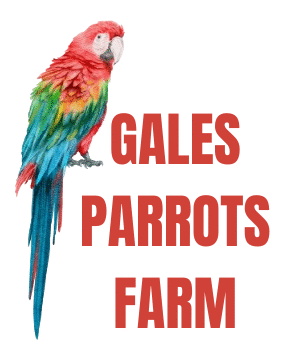⭐⭐⭐⭐⭐
Galesparrots Farm was with us every step of the way during the parrot adoption process. They answered all our questions and made sure we felt fully prepared for our new feathered family member. The breeder was absolutely amazing!
— Valerie W.
Avian Health & Wellness
Your parrot has received comprehensive veterinary care before joining your family. This includes a full wellness exam by an experienced avian veterinarian, along with any necessary vaccinations or preventive treatments. Your bird has also been regularly monitored for parasites and kept in a clean, health-focused environment while at our farm.
Please keep a copy of your parrot’s health records to share with your personal avian veterinarian, so they can continue proper care and schedule any needed follow-ups.
🩺 Vaccinations & Sensitivities
While vaccines are not always required for companion parrots, we work closely with our vet to ensure your bird is healthy and protected as needed. If any vaccination is administered, we recommend it be given as the only medical procedure that day , as birds can sometimes have sensitivities to medical interventions.
What’s Normal, What’s Not?
🦜 Sneezing:
Occasional sneezing is normal, especially during the first few days as your parrot adjusts to its new environment. Parrots can be sensitive to airborne particles like dust, aerosols, cooking smoke, cleaning products, scented candles, or strong perfumes. If your bird sneezes occasionally but seems otherwise healthy and active, there’s usually no cause for concern.
However, frequent sneezing accompanied by nasal discharge, wheezing, or lethargy should be checked by an avian vet.
🦜 Watery Eyes or Nostrils:
Mild tearing or clear discharge from the eyes or nares (nostrils) may occur during adjustment. Clean gently with a damp cloth or saline solution.
But if you notice redness, swelling, thick discharge, or crusting , this could indicate an infection or irritation — contact your vet.
🦜 Behavior Changes:
A sudden drop in energy, appetite, or vocalization can signal illness. Birds often hide symptoms until they’re quite unwell, so subtle changes can be important.
If your parrot stops eating, becomes unusually quiet, or shows signs of distress, please seek veterinary care promptly.
🦜 Feather Plucking or Over-Grooming:
This can be behavioral or medical. While occasional preening is normal, excessive feather loss or skin damage should be evaluated by a vet familiar with birds.
*Some plants can be VERY TOXIC to your parrot. Lilies, including the pollen, can cause serious illness or even death. Other common toxic plants include: sago palms, azaleas, rhododendrons, dieffenbachia, cannabis, mistletoe, holly, amaryllis, daffodils, tulips, and paperwhites. Please check your indoor and outdoor plants to ensure they are safe for your new feathered friend.
*Your parrot has been raised in a clean, controlled environment with strict hygiene practices to keep them healthy and protected. Once they come home with you, they will naturally be exposed to new germs, which will help build their immune system over time. However, too much exposure too soon can be risky.
Pets, shoes tracking in bacteria, and visitors can all introduce new pathogens into your home. We recommend asking guests to remove their shoes and wash their hands before handling your bird. While your parrot will become stronger as they grow, they are still very young and sensitive during these early weeks. Do your best to limit unnecessary exposure and maintain a calm, clean space for your new companion.
Your parrot’s feathers are an important part of their health and well-being. While they do a great job preening themselves, they may need help reaching certain areas. Regular human interaction and gentle brushing around the head and neck (if your bird is comfortable with it) can help keep feathers in top condition.
*We’ve made sure your bird is already accustomed to being handled and inspected. Let them see what you’re doing and offer a calm, reassuring presence during grooming moments.
*Bathing or misting is a great way to support feather and skin health. Some birds love showers, while others prefer a light misting with warm water. We recommend regular bathing sessions to help remove dust and dander and keep feathers soft and clean.
*Nail trims were done regularly while your bird was with us. Most parrots naturally wear down their nails on perches, but occasional trimming may be needed. We never recommend wing clipping unless absolutely necessary for safety — and even then, it should be done by a professional.
*Please note: we strongly oppose declawing or any unnecessary invasive procedures. Your parrot does not need to be declawed and should never be subjected to this painful practice.
*If your bird will be spending time outside of the cage, consider offering a designated play stand or perch where they can stretch, climb, and exercise safely.
⭐⭐⭐⭐⭐
Galesparrots Farm was with us every step of the way during the parrot adoption process. They answered all our questions and made sure we felt fully prepared for our new feathered family member. The breeder was absolutely amazing!
— Valerie W.
⭐⭐⭐⭐⭐
Everything went smoothly from start to delivery. The helpful information and regular updates made the entire process so reassuring. I highly recommend Galesparrots Farm !
-Margaret N .
⭐⭐⭐⭐⭐
Galesparrots Farm was there for us every step of the way through the parrot adoption process. All our questions were answered, and we felt completely prepared for our new feathered friend. The breeder was truly amazing!
— Valerie W.
⭐⭐⭐⭐⭐
My little guy is absolutely perfect! He’s so sweet, cheerful, and full of energy — and did I mention stunningly beautiful? Galesparrots Farm has been a joy to work with, and I highly recommend them. Very professional and reliable. The travel arrangement to meet my new feathered friend went smoothly — right on time, and the communication throughout was excellent.
— Norma G.
